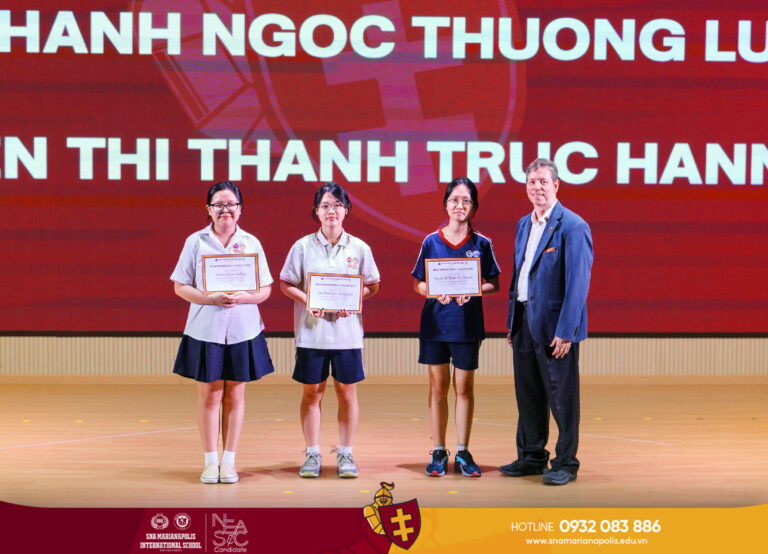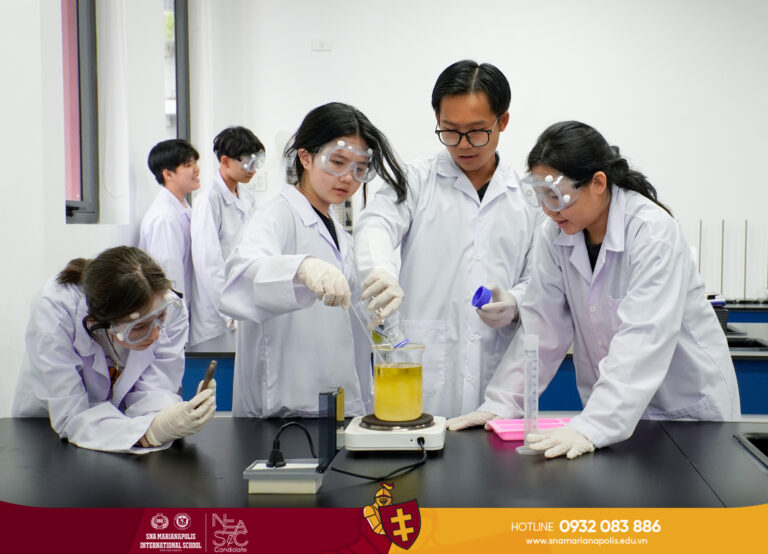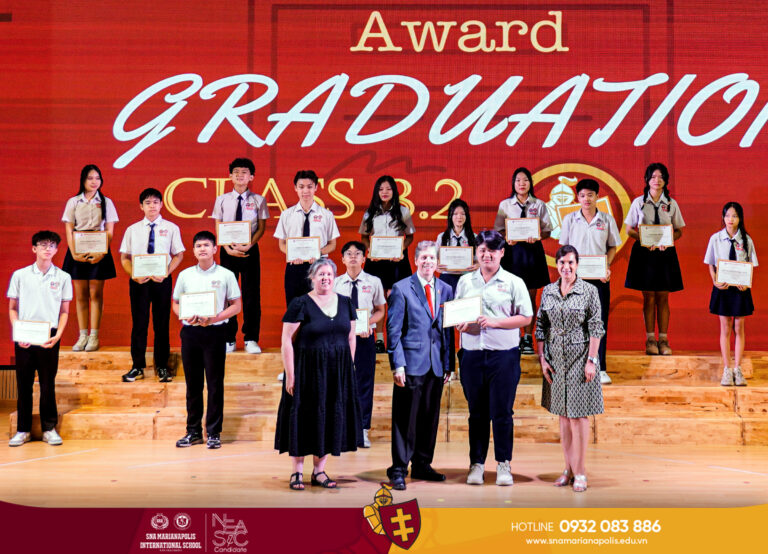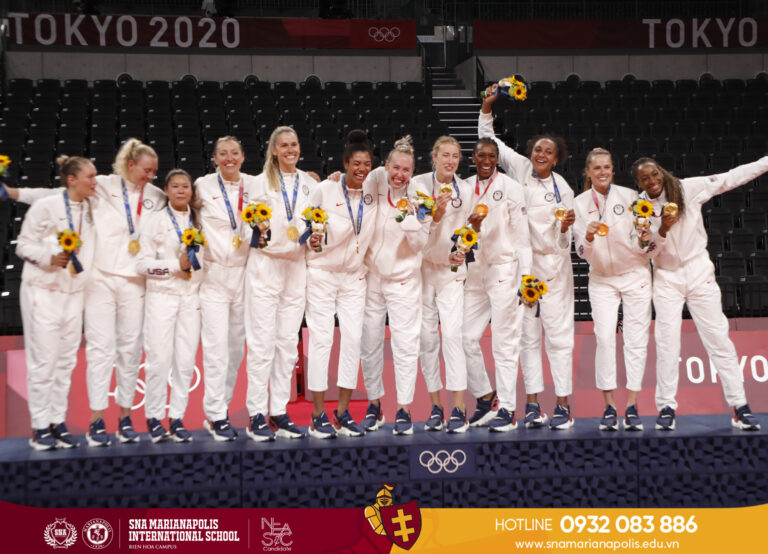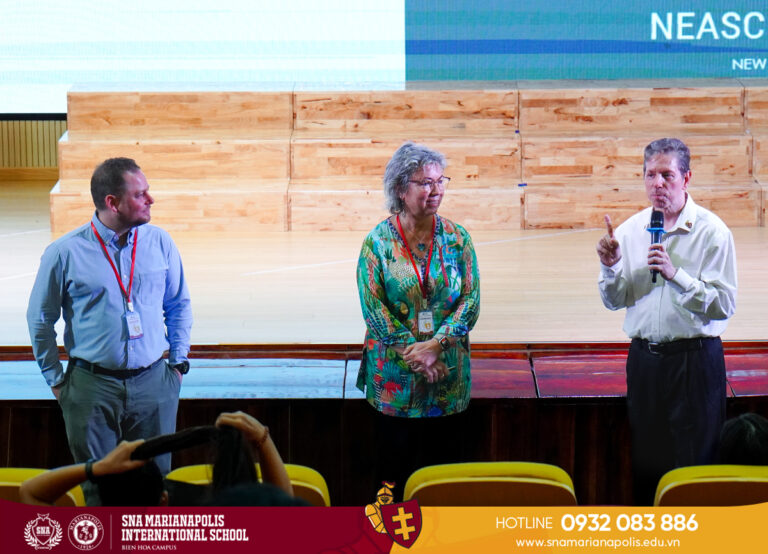Ms. Joanne Gökçedağ is an experienced teacher with about 30 years teaching around the globe in Turkey, Kuwait, England, and also Vietnam. Throughout her career, she has also worked as a teacher trainer for the Cambridge University Press and for her previous school in Turkey, where she organized and presented seminars about teaching methods and provided individual mentoring on demand for new teachers. At SNA Marianapolis International School, Ms. Joanne is currently teaching Science for grades 7 and 8 and leading the Secondary Environmental Club besides serving as the Science Department Head.

Along the 4th floor hallway, Ms. Joanne’s classroom stands out among others with an impressive door decoration that is changed frequently according to the occasions. That, to Ms. Joanne’s pride, is attributed to her students’ combined ideas and efforts, but it is just one of many student work examples you can find in her class.
“I Love Doing Projects”
Ms. Joanne has earned an impression as an innovative teacher who bases her teaching mostly on hands-on projects. Walking into her classroom, one can admire the various student posters and models on display on the shelves and bulletin boards. She beamingly shares, “It’s interesting I received a text message from an old student in Turkey yesterday, saying ‘I miss your creative projects.’”
On being asked about her motivation and inspirations, she passionately said, “I love doing projects. I love doing things that will show what the students have learned.” As such, projects, for her, are not just an assessment method. It is also a learning activity but in a much more captivating way for students.





Next week, Ms. Joanne’s class will cover plant reproduction, life cycles, and seed dispersals, which will culminate in a final project on reproduction where students are allowed to choose the products and the methods of their presentation. All that Ms. Joanne gives to her students are the topic and the rubric that clearly instructs them on what criteria they will be assessed on, including content, presentation, relevancy, and teamwork, in which students are graded individually based on their contribution to the group work.
“It’s All about Having Students Involved”
“It’s all about having students involved,” she shared when it comes to the core purpose of having a project-based class. The fact that her students are granted most authority in the project allows them to practice leadership and collaboration among their group. At the same time, students become autonomous learners, synthesizing their knowledge and presenting it in a way that shows they have understood it fully.

“I Steer Away From Traditional Tests As Much As I Can”
With that saying, Ms. Joanne laughed heartily when asked if she used projects to replace the paper-and-pencil tests. “I steer away from traditional tests as much as I can.” Instead, she would offer a diversity of assessment formats, including quizzes, worksheets, presentations, Kahoot or Ed Puzzles games, and of course, projects. She would not refuse if the students take the initiative to redo the quizzes or Kahoot games two or three times, as she believes, “The more they do it, the more they are learning.”
Formal tests are not completely abolished from her teaching, but she turns them into open-note, open-book tests which allow students to freely refer to their notes and formulas to answer open-ended questions and solve practical problems. She makes great efforts in making her tests relevant and relatable to students’ life, covering subjects as far as emojis, velocity, and traits. Such relevant tests reflect the problem-solving process in real life, as students can easily look up formulas or facts online but need refined skills to analyze and apply the available information to tackle their issue.


Her approach to testing takes her students by surprise all the time since they are so used to cramming for tests by memorizing literature quotes, historical events and mathematic formulas. Ms. Joanne explains to her students, “I’m not testing you on what you can remember. I want to see if you can use what you have got to answer real life questions.” In her experience, this approach is common in international education, for instance, in Science qualification tests such as A-level or IGCSE where no memorization of formulas is needed.
“My Class Wouldn’t Be a Normal, Quiet Class”
Another benefit to having an alternative assessment method, according to Ms. Joanne, is relieving students from the immense anxiety and stress they normally would get from traditional formal tests. Instead, both at SNA Marianapolis school and in her previous teaching years, she witnessed her students more relaxed and having fun when working on the class projects. “My class wouldn’t be a normal, quiet class as the students will constantly make noise and talk in excitement while working together,” she is keen, “and it is wrong to assume that students won’t be able to learn with too many things like that going on.” Indeed, the fun and collaborative atmosphere also enables Ms. Joanne to walk around to interact, modify, and instruct the students’ performance, making it a dual and ongoing learning-assessing process that is also student-centered.


Stay tuned for Part 2.
For more information about the curriculum, please kindly contact our Admissions via Hotline at 0932 083 886 or fill out the form below
REGISTRATION FOR ADMISSIONS



